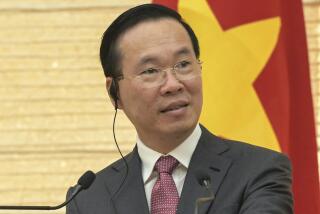Vietnam Clings to Military Ties
- Share via
HANOI — With the economy flagging and investor disenchantment growing, Vietnam has turned to a conservative Communist with a military background to lead the country into the 21st century.
On the surface, the ascension of Le Kha Phieu, 66, to Communist Party secretary-general--the most powerful post in Vietnam--appears to be a victory for old guard Communists who want to slow the pace of economic reform and keep the economy under heavy state control.
Phieu, who in 1966 said, “Capitalism will definitely be replaced as it is backward in satisfying the people’s desire for happiness,” succeeds party chief Do Muoi, 80.
Muoi led Vietnam into a decade of change that saw the emergence of a free-market economy but ended up backing away from reforms he once supported.
Not widely known even in Vietnam, Phieu, a general, was elected in a closed party meeting Monday. He made his reputation as a military political commissar, not a battlefield commander, and has most recently been in charge of party ideological training and internal security. His appointment once again reflects how out of step Vietnam is with the rest of Asia.
While the military has largely stepped back from politics in Thailand and China and political ideologues have widely fallen out of fashion, Vietnam has been unable to shed the notion that control--of the economy, the political apparatus and the information available to the public--is the state’s ultimate responsibility.
Many economists have warned that Vietnam’s insistence on clinging to inward-looking policies that have failed elsewhere could doom the country’s hope of catching up with its more advanced neighbors.
Singapore’s Senior Minister Lee Kuan Yew, who in 30 years transformed his city-state from a fishing village into one of the region’s most prosperous, efficient countries, added his voice to the chorus in November when he came to Hanoi and stunned his hosts with a critical assessment of the local climate for foreign investors.
“I have spelled out for them [Vietnamese officials] the implications for our investors and for all the other investors, and that they are killing them,” Lee told a news conference.
He said Vietnamese leaders must look at the world and decide “if they wanted to be contrarians.” They have to realize, he said, that investors come to Vietnam to make a profit, not to reconstruct the country. But Lee said he was unsure his message got through.
Although Vietnam’s new prime minister, Phan Van Khai, 63, and new president, Tran Duc Luong, 60, realize the urgency of economic restructuring, traditionalists in the Communist Party have clearly put the brakes on reform, avoiding risk for the sake of caution and barely concealing their concerns that foreigners are out to undermine Vietnam’s independence.
“The prime minister knows something has to be done, but he’s just not sure what,” said a European economist. “The second-level people just recite old slogans that sound nice but aren’t relevant to anything. The bottom line is that at some point the party will have to step back or Vietnam is not going to make it.”
Within Vietnam’s leadership, there appears to be the realization that the government has lost touch with the people. The postwar urban generation shows no interest in ideology; in the countryside--where 80% of Vietnam’s 75 million people live--there is growing discontent over high taxes, corruption and the unresponsiveness of officials to local problems.
At least six provinces have experienced social unrest in 1997. The most serious disturbances have been in Thai Binh province, 65 miles southeast of Hanoi, where heroes of Vietnam’s revolution--military retirees--have conducted well-organized protests. The problems appear to have been key elements in convincing the party that it was losing control and needed to scale back the pace of change.
The key to Phieu’s success or failure, one Western economist said, is whether he understands the depth of national problems.
“I don’t think you can necessarily judge his future actions on the basis of his past credentials,” the economist said. He added that if Phieu proves to be an outward-looking leader, having a conservative in charge could be a benefit because he would have greater influence with hard-liners than would a reformist.
More to Read
Sign up for Essential California
The most important California stories and recommendations in your inbox every morning.
You may occasionally receive promotional content from the Los Angeles Times.













